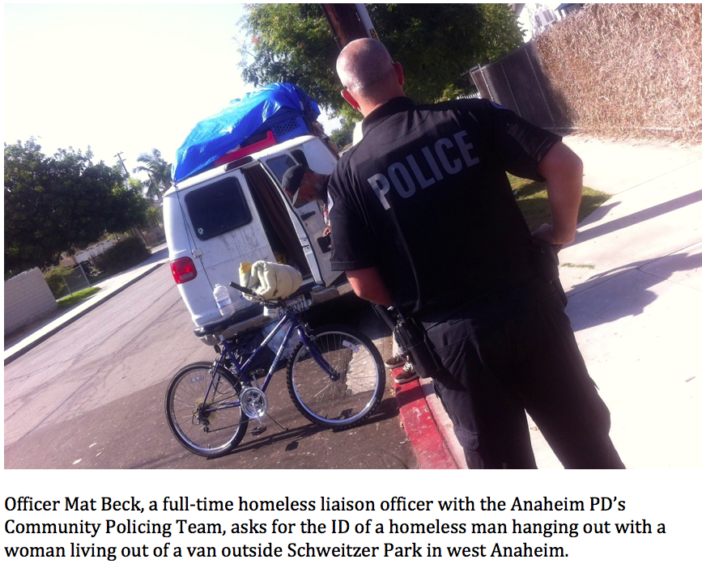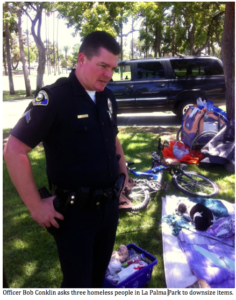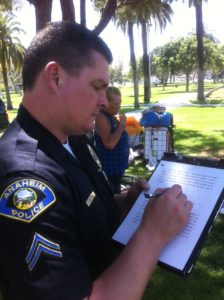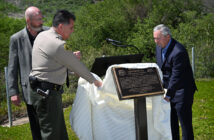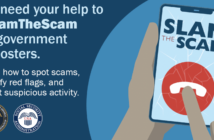Anaheim Police Officer Bob Conklin rolls up to La Palma Park in an unmarked black GMC Yukon XL.
“Day by day, one person at a time,” Conklin says as he surveys pockets of homeless people dotting the 21-acre park at Harbor and Anaheim Boulevards.
Conklin makes a beeline to a group of three homeless people – two women and a man – whose sizable belongings are clearly visible to passing motorists on Harbor Boulevard.
Late last year, two new city ordinances took effect that prohibit camping or mass property storage of personal belongings in public areas.
A couple of months before that, the Anaheim PD launched a Homeless Outreach Team in an effort to direct people living on the street to services they need instead of simply slapping them with tickets for minor offenses – enforcement that does little to break the cycle of homelessness.
“Downsize this stuff,” Conklin tells the trio. The women are applying makeup. The shaggy haired man is lying on a blanket.
Conklin, 36, then tags their items and tells them to clear most of it out within three hours, directing them to a free storage facility across the street.
“They can organize their belongings to a manageable amount so we won’t bother them,” Conklin explains as he approaches a woman sleeping beside a Costco shopping cart packed with her belongings.
“Do you want to be linked up with any mental health services?” a county mental health specialist on the call with Conklin asks her.
“Yes,” the 58-year-old woman responds. “I need help.”
The woman ends up being taken into custody because of an outstanding bench warrant on a misdemeanor charge.
The Anaheim PD’s new Homeless Detail, which includes four full-time homeless liaison officers — Conklin is one of them, joined by Sgt. Mike Lozeau, Officer Mat Beck and Officer Jacques Laffoon — is an effort to reduce a homeless population that ranges from about 350 to 450 on any given day.
Part of the PD’s Community Policing Team, the Homeless Detail also was launched to slash the number of calls for service regarding public safety issues related to homeless people – panhandling, urinating or defecating in public, intimidating customers outside businesses.
Prior to the formation of the Homeless Detail, such calls for service typically exceeded 500 per month in Anaheim, eating up a lot of police resources that could have been devoted to more serious crimes.
The Anaheim PD’s Homeless Detail has become a model for other local law enforcement agencies that have a significant homeless population.
Conklin and the other officers on the Homeless Outreach Team work closely with local churches and nonprofit groups, such as the Coast to Coast Foundation, to connect people living on the street or out of their cars with rehab centers or relatives who may be able to take them. They also direct them to places where they can get motel vouchers, bus passes, clothes and food – as well as places to temporarily store their belongings.
When Conklin goes out on calls, he frequently teams up with two uniformed officers on a Psychiatric Emergency Response Team (PERT), which also includes a county-employed mental health specialist.
The specially trained PERT team responds to calls involving people who are experiencing a mental health-related crisis.
On a recent ridealong, Conklin and the PERT officers, along with a county mental health specialist, rolls out to the scene of a suicidal woman.
A 24-year-old woman sits on a sidewalk on E. Broadway Street near Elder Street.
Her younger brother says she was threatening to jump in front of a car.
“We’re here to help you,” Conklin tells the woman, who has a tattoo of a marijuana leaf on her left leg. She recently had spent 14 days in a psychiatric hospital.
“I’m not crazy,” the woman tells Conklin.
After spending about 20 minutes with the officers, who determine that the woman was diagnosed with depression and likely using meth, an ambulance is summoned to take her to a hospital on a 72-hour involuntary psychiatric hold known as a “5150.”
On another call, Conklin summons a caretaker to take a drunk 50-year-old woman who had been panhandling outside of a donut shop back home.
On another call to Schweitzer Park in west Anaheim, Conklin orders a woman living out of a van overflowing with personal items to trim down her load. She has been living out of her van since last December, she tells Conklin.
“Do you have any mental health issues?” he asks her.
“Depression.”
“Do you have any meds?”
“No.”
Conklin offers to help the woman get in touch with relatives up north.
“She’s in need of a positive family support structure,” he says.
He and the other officers ask her male companion if he would like to go to a detox home.
The man says he’s open to the idea.
Heading back to Anaheim Police headquarters, Conklin, who worked patrol and traffic before joining the Community Policing Team in July, says agencies like the non-profit Coast to Coast Foundation help some of the homeless he encounters get off the streets.
“The homeless population never expects this kind of response from the police,” Conklin says of the Homeless Outreach Team. “They never expect us to want to help them – but we are.”
Adds Conklin: “We want them to become self-sufficient and put them on a path that allows them to improve their situation.
He then goes back to his office to wait for his next call — hoping to make a difference, one person at a time.
 Behind the Badge
Behind the Badge
